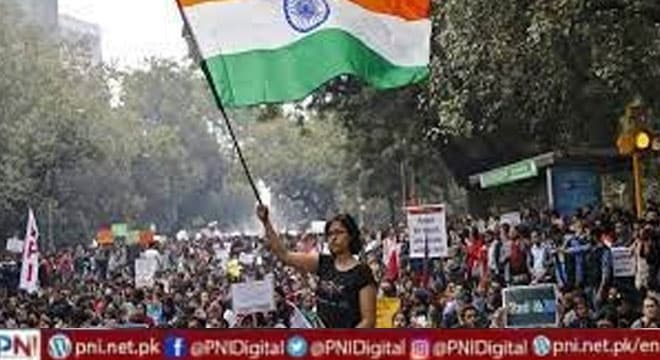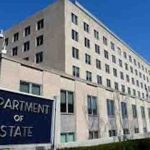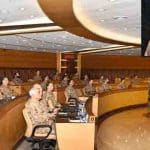ISLAMABAD, Aug 3 (APP): The Bharatiya Janata Party (BJP) led by Prime Minister Narendra Modi is the biggest advocate of Hindutva ideology and is highly critical of secular policies such as freedom of expression, and the right to freedom of religion and practices for the last eight years.
This approach towards Hindu nationalist policies are resulting in systematic, ongoing, and egregious violations of religious freedom which negatively impact non-Hindu religious
communities including Muslims, Christians, Sikhs, Dalits, and Adivasis.
As the BJP had also been criticized in the Human Rights Watch (HRW) World Report 2022, which pointed out that Bharatiya Janata Party (BJP)-led government in India “adopted laws and policies that discriminated against religious minorities, especially Muslims.
This, coupled with the vilification of Muslims by some BJP leaders and police failed to take action against BJP supporters who commit violence, emboldened Hindu nationalist groups to attack Muslims and government critics with impunity.”
Even, the Indian government cracked down on activists, journalists, peaceful protesters, and even poets who were raising voices against this injustice, it added.
The recent controversial Citizenship Amendment Act (CAA) combined with the National Register of Citizens (NRC) provided a pathway to citizenship for non-Muslims but has no remedy for Muslims caught up in NRC processes.
Those who were unable to prove their citizenship through documentation are subject to statelessness, deportation, and even detention.
Nationwide protests were witnessed against this cruel law but the Modi-led government suppressed these voices by use of force violating basic human rights.
The 2021 annual report by the United States Commission on International Religious Freedom recommended India be placed on a religious freedom blacklist.
Professor Dr. Ishtiaq Ahmed from Qaid-e-Azam university (QAU) opined that although India is a big country with multiple ethnic groups and religions but it is emerging as a non-secular country as minorities are being deprived of their basic constitutional rights.
He said particularly in the last 30 years problems are increasing for minorities in India, starting with the Babri mosque incident, Hindu nationalism has increased.
However, during Modi’s regime minorities were suppressed expeditiously and due to this
political trend, India is moving towards its disintegration and instability, for instance, in Khalistan’s movement, he concluded.
Furthermore, as far as the rights of the people of Kashmir,hundreds of people remained detained without charge in Jammu and Kashmir under the draconian Public Safety Act, which permits detention without trial for up to two years.
Similarly, BJP is linking the basic demands of Indian nationals including Sikhs as agenda of separation, such as Hundreds of thousands of farmers, many of them from the minority Sikh community, protesting amendments to farm laws since November 2020, was accused by BJP leaders and pro-government media of having a separatist agenda.
For instance, according to Indian media, BJP alleged that the Khalistani agenda is being propagated under the garb of the Punjab farmers’ agitation.
While in February 2021, Prime Minister Modi described people participating in various
peaceful protests as “parasites.”
India’s brutal actions against minorities are causing dissent voices and raising questions in the international community about its claim as a secular country.
Dr. Ejaz Hussain an Associate professor of social sciences at Iqra University, talking about the plight of minorities in India and reasons for dissent voices argued that the plight of Muslims and other minorities in India is appalling.
“Only last year, Christians in various Indian states such as Assam were bullied while they were observing their religious rites in the Presbyterian church” he added.
Similarly, RSS-inspired Hindu zealots violated Christian religious symbols in the state of Haryana, too. Not only this, certain BJP lawmakers launched a campaign to covert Christians ‘back’ to Hinduism”.
To cap it, in the RSS-controlled and BJP-led India, political and socioeconomic space is being systematically curtailed for the minorities. It is indeed a herculean task to demand one’s constitutional rights in the Indian states where RSS-BJP is ruling the roost.
India claims itself to be the largest secular country but does not justify it because religious minorities and dissenting voices are being suppressed resulting in grave human rights violations, said Farid Rais, a senior TV anchor, and political commentator.
BJP, a nationalist party in India, has further fueled the circumstances. Since taking power in 2014, Modi’s Hindu Nationalist government has been accused of persecuting minorities, especially its 200 million Muslims.
Arguing about increasing dissent voices, Farid Rais further stated that there are several unrelenting Indian separatist movements from Khalistan to Nagaland.
These movements represent the territorial, ethnic, and humanitarian issues within the state. For decades the separatist in Nagaland, Manipur, Haryana, Arunachal Pradesh, and the Indian Punjab have been demanding freedom from India. More often than not, India has used force to suppress these movements.
In the particular case of illegal Indian-occupied Kashmir and Khalistan, India has committed grave human rights violations killing thousands.
India has been avoiding the right of plebiscite according to the United Nations resolution.
More than 0.9 million uniformed force is used to suppress their voice. Use of chemical
weapons, pellet guns, illegal detention, extrajudicial killings, rape, and lock down altogether has not been able to suppress the struggle, he added.
Follow the PNI Facebook page for the latest news and updates.









